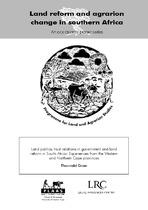Land politics, trust relations in government and land reform in South Africa: Experiences from the Western and Northern Cape provinces
Abstract
The land question, as it is posed academically in South Africa, is at the cutting edge of the development debate.1 Should land held by poor peasants, often under some kind of communal tenure, be re-organised as private property and absorbed into the market economy? Should land reform therefore target emerging commercial farmers? Or do communal forms of tenure and the subsistence-oriented modes of multiple livelihoods in rural areas have their own development and change potentials that can be released with support from appropriate infrastructure, despite the often dire and increasing poverty in such communities? (May 2000). The first ‘modern’ option assumes a massive movement of excluded people to the urban areas.2 The second option, unconditional support to subsistence livelihoods on communally held lands, and increased integration into markets, can lead to development without such a massive movement. However, the second option can seem irrelevant from an economic point of view. The contribution of financial surplus to the modern economy from subsistence production is limited or negative.

